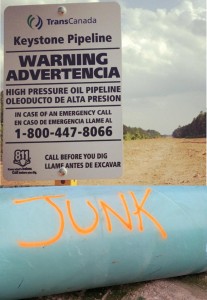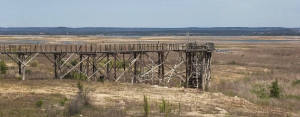During Tuesday’s State of the Union address, President Obama pledged to have it both ways on climate change and energy – taking action on climate change while touting an “all of the above” energy strategy.

President Barack Obama delivers the State of Union address before a joint session of Congress in the House chamber Tuesday, Jan. 28, 2014.
Larry Downing/AP
On the one hand, President Obama renewed his commitment to reducing carbon emissions and battling climate change. But on the other hand, he pushed for the expansion of domestic fossil fuel extraction and pledged his support for natural gas as part of his “all of the above” energy plan. He said, “The ‘all the above’ energy strategy I announced a few years ago is working, and today America is closer to energy independence than we have been in decades.”
The president threw his weight behind natural gas, saying, “If extracted safely, it’s the bridge fuel that can power our economy with less of the carbon pollution that causes climate change.” He promised to “cut red tape” to spur the construction of natural gas fired factories and fueling stations for cars and trucks.
Even though natural gas emits half as much carbon dioxide as coal when combusted, the primary component, methane, is also released into the atmosphere during production. Methane is a potent greenhouse gas and traps significantly more heat in the short term than carbon dioxide. New reports are concluding that fugitive methane emissions from extraction, processing and transportation could be much worse than previously thought. An article from OilPrice.com says, “If the latest figures are accurate, it could mean that the greenhouse gas advantage that natural gas has over coal could be a mirage.”
The president also gave a shout-out to solar energy, saying, “It’s not just oil and natural gas production that’s booming; we’re becoming a global leader in solar, too.” “The shift to a cleaner energy economy won’t happen overnight, and it will require tough choices along the way,” said Obama. “But the debate is settled. Climate change is a fact. And when our children’s children look us in the eye and ask if we did all we could to leave them a safer, more stable world, with new sources of energy, I want us to be able to say yes, we did.”
Although the president has made tremendous strides to address climate change, his administration is still encouraging the extraction of coal, oil and natural gas from our public lands and water. (Click here to see a report from the EIA: Sales of fossil fuels from Federal and Indian Lands) Fossil fuel industries are also looking to expand coal and liquid natural gas (LNG) export terminals. All of this on top of recent proposals to end a 40 year ban on crude exports extracted in America.
Sometime this year the proposed Keystone XL pipeline will come across the president’s desk. If approved, the Keystone XL pipeline will provide tar sands producers in Canada a supply line to refineries on the Texas Gulf Coast and an export strategy. Although the president made no mention of the pipeline in his speech, he will have to make a decision on the project later this year. He has said his decision will be based on whether or not the Keystone XL pipeline “significantly exacerbates” carbon pollution and is in the national interest. On Friday, the State Department released its environmental assessment that says the Keystone XL pipeline would cause minimal climate impact because the tar sands would get to market some other way without the Keystone XL pipeline – a strikingly fatalist position.
Both sides of the president showed up on Tuesday to address the nation. His “all of the above” energy side showed up to cheerlead the fossil fuel industry, while at the same time tossing a bone to environmentalists, pulling from his Georgetown Speech he made last summer. President Obama’s climate legacy still has yet to be shaped, and if wants be viewed by future generations as the president that made a firm commitment to fighting climate change, then he needs to quit talking out of both sides of his mouth.
(more…)









